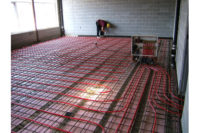The Plastics Pipe Institute named Uponor’s San Diego State University student union building project as a Project of the Year by the Building and Construction Division. The original building was demolished to replace it with a highly sustainable, 202,000-sq.-ft., LEED Platinum three-story structure.
In order to enable the new HVAC system at the new student union building to consume 40% less energy than a traditional system, an in-slab radiant heating and cooling system was installed. This was one of the qualifications for the building to meet LEED Platinum requirements. It also reduced energy use and improved indoor air quality. The system used more than 14 miles of PEX tubing from Apple Valley, Minn.-based Uponor North America in 36,000 sq. ft. of floor space.
The LEED-Platinum SDSU Aztec Center is a project known for its sustainable design, including a green roof and an underground rainwater collection storage. Nearly 80% of the materials from the original building were recycled or reused in the new structure. Incorporating a radiant heating and cooling system that uses flexible, durable PEX piping for the in-slab system helped the project meet its design requirement of consuming 40% less energy while also offering greater comfort to occupants.
Because water has the capacity to transport energy 3,500 times greater than air, a PEX-based hydronic system can heat and cool a structure using much less energy than a traditional forced-air system. And radiant heating and cooling aligns with the body’s natural thermal curve, so occupants are even more comfortable with radiant than with a forced-air system.
Completed in 2014, the project used 75,000 ft. of Uponor’s 5/8-in. Wirsbo hePEX oxygen-barrier PEX tubing on three floors on the west side of the building to serve 36,000 sq. ft. of space, including dining and lounge areas on the first floor and meeting and offices spaces on the second and third floors. The tubing was spaced 6 in. on center and fed by 21 Uponor engineered polymer manifolds. The chilled and heated water is supplied from the campus central utility plant.
The PPI award was presented to Uponor during the association's annual meeting held in Coeur d'Alene, Idaho, May 3-6, 2015.
“With the emphasis on LEED and green building continuing to grow with each passing year, use of a PEX-based system in projects such as the university’s new student center shows the importance plastic piping plays in sustainable building practices,” stated Tony Radoszewski, PPI president. “It can effectively heat and cool a large structure to keep occupants comfortable and also offer a 40% reduction in energy consumption. Because projects can incorporate hydronic radiant systems into other sustainable building practices, such as geothermal, solar and a dedicated outside air system, it is an ideal option for large commercial structures that consume great amounts of energy.
“Using PEX in a LEED-Platinum project to help boost energy efficiency shows the value a PEX-based system brings to sustainable building practices. In addition, with the flexibility and strength of a PEX piping product that can be buried in the slab to effectively warm and cool a large structure, the professional community — including installers, project managers, architects and engineers — as well as the students, families, faculty and staff using the building, can see that PEX is a durable product that is manufactured to last for decades of successful use."
Randy Knapp, director of engineering for PPI BCD, said: “PEX pipe is a product that satisfies the needs of homeowners, builders and plumbers by providing long-term performance, and making installations more labor and cost efficient. PEX is the material of choice for radiant heating systems and is quickly replacing copper for residential potable water plumbing.”
Other applications of PEX include AWWA municipal water service; snow- and ice-melt systems; turf conditioning; residential fire sprinklers; and geothermal systems. Typically found in sizes from 3/8 in. to 2 in. and up to 3 in. in diameter, PEX pipe comes in straight lengths or coils and is made from proven high-performance materials.
The PPI Project of the Year recognition program honors significant industry contributions and professional achievements. For more information, visit the Plastics Pipe Institute website: www.plasticpipe.org.
Uponor project wins PPI Project of the Year Award
PEX pipe heating and cooling system key to honor.

More than 14 miles of Wirsbo hePEX oxygen-barrier PEX tubing was installed in all three floors of the San Diego State University student union building for the radiant heating and cooling system. Photo credit: Uponor

The new SDSU Aztec Student Union Center is a new, highly sustainable, LEED-Platinum structure complete with a PEX-based hydronic radiant heating and cooling system that helped reduce energy consumption by 40% while keeping occupants comfortable all year long. Photo credit: Uponor

The project used 21 Uponor engineered polymer manifolds, which fed the PEX tubing loops for the radiant heating and cooling system. Photo credit: Uponor

Kate Olinger of Uponor North America receives the PPI Project of the Year Award from PPI's Randy Knapp, director of engineering, building and construction division (left) and Tony Radoszewski, president (right). Photo credit: Uponor

